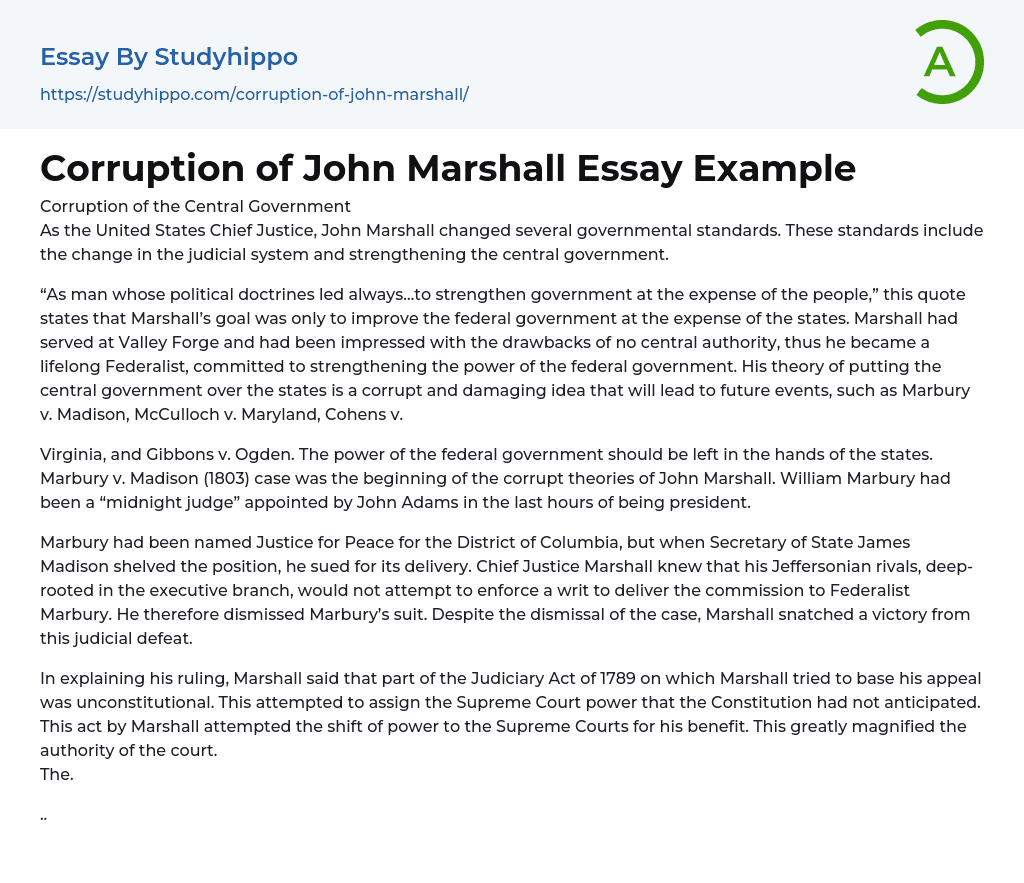During his time as the Chief Justice of the United States, John Marshall initiated alterations in the judicial system as a reaction to the corruption present within the central government and its subsequent strengthening.
The quote describes Marshall as someone who prioritized enhancing the federal government's authority at the cost of the public. Marshall's experiences at Valley Forge convinced him of the need for a strong, centralized government, and he remained loyal to Federalism throughout his life. His belief in favoring the central government over states is deemed as a harmful and dishonest concept that can lead to future occurrences like Marbury v. Madison, McCulloch v. Maryland, and Cohens v.
The cases of Virginia and Gibbons v. Ogden advocate for leaving the power of the federal government to the states. On the other hand, the Marbury v. Madison
...case in 1803 marks the onset of John Marshall's corrupt theories. This case involved William Marbury, who was appointed as a "midnight judge" by John Adams in the eleventh hour of his presidency.
Marbury filed a lawsuit for the position of Justice for Peace in the District of Columbia after Secretary of State James Madison refused to deliver it. Chief Justice Marshall predicted that Marbury's suit would not be upheld as the executive branch was dominated by the Jeffersonian party. Thus, Marshall dismissed the case but succeeded in turning a judicial setback into a minor victory.
Marshall's justification for his choice was that the Judiciary Act of 1789, which he utilized for his appeal, transgressed the Constitution by conferring more power to the Supreme Court than was intended. This shift in authority to Marshall's advantage eventually resulted in an augmentatio
of the court's impact and a substantial amplification of its jurisdiction.
I'm sorry, there is no text provided for me toand unify while keeping the and their contents. Please provide the text so I can assist you.
- Federal government essays
- Armed Forces essays
- Confederate States Of America essays
- Federal Government Of The United States essays
- Fourteenth Amendment To The United States Constitution essays
- Governance essays
- Parliament essays
- Politics essays
- Jurisdiction essays
- Bureaucracy essays
- Separation Of Powers essays
- Congress essays
- President essays
- United States Congress essays
- Non-Commissioned Officer essays
- Appeal essays
- Revenge essays
- Corporate Governance essays
- Public Service essays
- Income Tax essays
- Supply essays
- Red Cross essays
- Democracy essays
- State essays
- Liberty essays
- Absolutism essays
- Reform essays
- Republic essays
- John Marshall essays
- Bourgeoisie essays
- Developed Country essays
- Elections essays
- International Relations essays
- Left-Wing Politics essays
- Monarchy essays
- Political Corruption essays
- Political Party essays
- Political Science essays
- Sovereign State essays
- United Nations essays
- World Trade Organization essays
- Contras essays
- Dictatorship essays
- Foreign policy essays
- Monarch essays
- Corruption essays
- Foreign essays
- Democratic Party essays
- European Union essays
- President Of The United States essays




